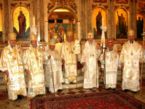Difference between revisions of "Chorbishop"
(New page: {{template:Clergy}} A '''chorepiscopos''', or '''chorbishop''', is an extinct office of clergy in the Church. The name is taken from the Greek Χωρεπίσκοπος, meaning "co...) |
(→Decline) |
||
| Line 6: | Line 6: | ||
==Disuse== | ==Disuse== | ||
| − | The Council of Sardica in 343 decreed that chorepiscopi should be consecrated where a priest would suffice, and so gradually their | + | The Council of Sardica in 343 decreed that chorepiscopi should not be consecrated where a priest would suffice, and so gradually their numbers substantially declined.{{ref|2}} In some [[diocese|dioceses]], the title "chorbishop" is sometimes used as an alternative title for an auxiliary bishop. However, it should be noted that the functions of an auxiliary differ from this specific office. |
==References== | ==References== | ||
Revision as of 00:43, July 2, 2008
| This article forms part of the series Clergy | |

| |
| Major orders | |
| Bishop - Priest - Deacon | |
| Minor orders | |
| Subdeacon - Reader Cantor - Acolyte | |
| Other orders | |
| Chorepiscopos - Exorcist Doorkeeper - Deaconess - Presbytide | |
| Episcopal titles | |
| Patriarch - Catholicos Archbishop - Metropolitan Auxiliary - Titular | |
| Priestly titles | |
| Archimandrite - Protopresbyter Archpriest - Protosyngellos Economos | |
| Diaconal titles | |
| Archdeacon - Protodeacon | |
| Minor titles | |
| Protopsaltes - Lampadarios | |
| Monastic titles | |
| Abbot - Igumen | |
| Related | |
| Ordination - Vestments Presbeia - Honorifics Clergy awards - Exarch Proistamenos - Vicar | |
| Edit this box | |
A chorepiscopos, or chorbishop, is an extinct office of clergy in the Church. The name is taken from the Greek Χωρεπίσκοπος, meaning "country bishop."
History
Chorepiscopi are first mentioned by the ecclesiastical historian Eusebius in the second century.1 In the days of the very Early Church, chorepiscopi seemed to have authority in rural districts, but in the second half of the third century they were subject to the urban episcopate, or metropolitans. The Synod of Ancyra (314) forbade them to ordain deacons and priests.
Disuse
The Council of Sardica in 343 decreed that chorepiscopi should not be consecrated where a priest would suffice, and so gradually their numbers substantially declined.2 In some dioceses, the title "chorbishop" is sometimes used as an alternative title for an auxiliary bishop. However, it should be noted that the functions of an auxiliary differ from this specific office.
References
- 1 Ott, Michael T. (1913). “Chorepiscopi.” Catholic Encyclopedia. New York: Robert Appleton Company
- 2 Chorbishop – AmericanCatholic.org